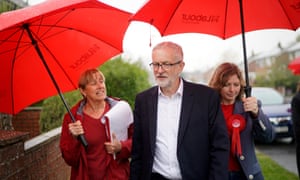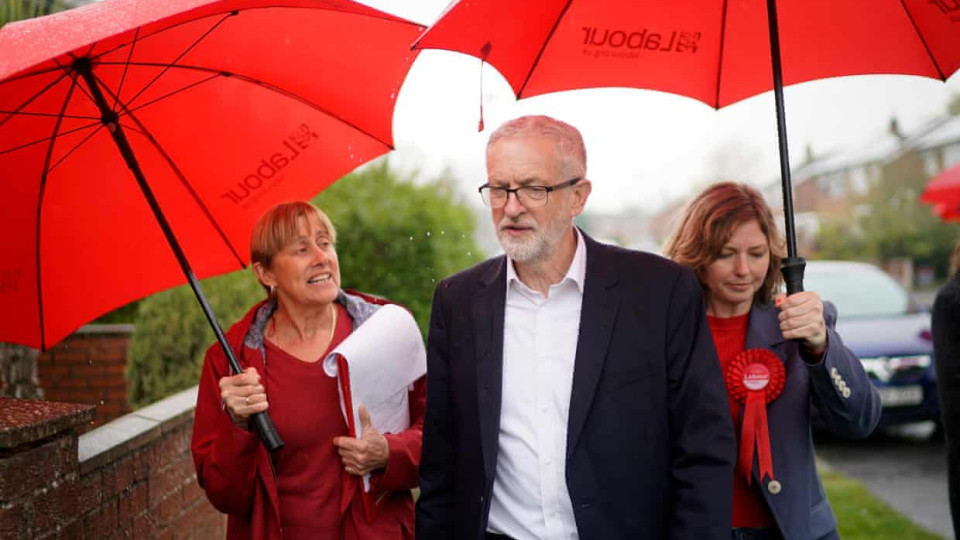

The voters blow a big raspberry to the two main parties and both react the same way: “OK, OK, we hear you. You just want us to get on with Brexit.” That was the line following Thursday’s council elections across much of England from both the prime minister and the shadow chancellor, John McDonnell – although the latter was quick to clarify that when he tweeted “‘Brexit – sort it.’ Message received” that didn’t, strictly speaking, mean he wanted Brexit to happen, just that the issue needed to be sorted out “whichever way”. So that clears that up.
Reading losses for both the governing and main opposition parties as a rejection of their handling of the issue that has consumed them both has an obvious logic. It’s a logic likely to gain extra force in less than three weeks, when Nigel Farage’s Brexit party could well top the poll at the European elections. Why else would voters call down a plague on both the Tory and Labour houses unless they were furious at their failure to implement what the public voted for in 2016?
Except there are other ways to look at these highly unusual and complex results. First, the clue is in the name: they were local elections, in which local motives and grievances often play the decisive part. Old-fashioned it might be, but people sometimes vote for a council because of what the council has or has not done, from housing policy to bin collections.
Second, even the canniest psephologists struggle to divine a consistent, Brexit-related pattern in these numbers. It may look as if Labour defeats in northern one-time heartlands are down to leave voters disaffected by the party’s fence-sitting on Brexit, but Prof Rob Ford tells me they may instead be a symptom of a different trend visible in these numbers: that “the more votes Labour had to start with, the more they lost”. In other words, Labourdropped off most in its safest seats, whether leave or remain.
There are signs too of a more general malaise afflicting the two parties, with voters sick of the sight of both of them, in line with the polls showing both Theresa May and Jeremy Corbyn with catastrophically low personal ratings. Such doldrums are common for a ruling party entering its 10th year in office, but all but unheard of for an opposition that should be reaping the benefits of the government’s unpopularity.
The success on Thursday not only of the Greens and Liberal Democrats but also of independent candidates – averaging 25% of the vote where they stood – suggests a serious surge in the “none of the above” vote. Ford wonders if British politics is reverting back to its pre-2017 fragmentation, with the general election of that summer, when the two big parties dominated, now looking like “an aberration”, rather than a restoration of the old duopoly. Again, the European elections later this month look set to confirm that view.
Still, let’s say that the initial May-McDonnell impulse kicks in and both Labour and the Tories decide their best interests lie in getting a version of Brexit over the line. There have been noises that Labour is inching in that direction, with hints this week that a Labour-Tory agreement on a customs union Brexit is within reach. Might Labour actually do such a deal?
The chief internal obstacle is often depicted by the leader’s allies as those pesky remainer MPs on the Labour benches, moderates and “Blairites” who in their despicable centrism have always opposed Jeremy Corbyn. But that’s really the least of the leadership’s worries. Enabling Brexit is opposed by plenty of Corbynites too, typified by the likes of Momentum’s national coordinator Laura Parker, the journalist Paul Mason or MP Clive Lewis. The leader’s team will not be eager to split their own faction or infuriate their own base. And that’s even before you get to the Commons, where any customs union proposal will immediately be voted down by at least 100 Tory MPs and will therefore demand the support of the vast bulk of Labour MPs. The whips will surely be telling Corbyn: you don’t have the votes.
And if he does try to persuade recalcitrant Labour MPs and members of this path, what electoral reward can he promise them? The council results suggest there is little gratitude among Labour leavers for Corbyn’s steadfast refusal to embrace the cause of remain. On the contrary, those Brexit-minded voters for whom the issue is decisive are surely likelier to vote for full-fat Brexit rather than Brexit-lite. They will be drawn to Farage or the Tories over an equivocating Labour.
If anything, the electoral arguments are stacking up on the other side. Thursday’s contests suggest a slow but steady rehabilitation of the Lib Dems as an acceptable receptacle of protest votes. The Greens, meanwhile, scored 12%, doubling their 2018 share. Both those parties are avowedly in favour of remaining in the EU, and they threaten to eat deeper into the anti-Tory vote on 23 May, when they will be joined on the ballot by Change UK (which, thanks to the impossibility of registering in time for these local elections, missed a big opportunity to make a mark). If the current hostility to the big two persists, Labour could find its own vote in the European elections alarmingly soft.
It points to a bleak prospect later this month, with the leave vote consolidating behind a triumphant Farage, while the remain vote splits at least four ways. But there is an obvious means to avert that scenario. If Labour made plain its commitment to submitting any Brexit deal to a confirmatory vote, it could staunch at least some of the haemorrhage of support to the remain parties.
This is the argument Labour thrashed out around the national executive table on Tuesday. I’m told that Diane Abbott, identifying herself as the MP for “remoan central”, told the group to “remember that our enemies are using this issue to drive a wedge between Jeremy and the membership”. Seeing this as a dastardly plot against the embattled but noble left is certainly one option, and it has a long tradition. But the other way of looking at it might be more productive: namely that, in its desperation to keep fishing in the Brexiter pool, Labour has turned its back on waters rich in anti-Tory voters who regard Brexit as a disaster that any opposition worth the name would be opposing. Labour could start fishing in those waters – or it could stand by, watching as its rivals steal that precious catch right from under its nose.
The Guardian









Leave a comment